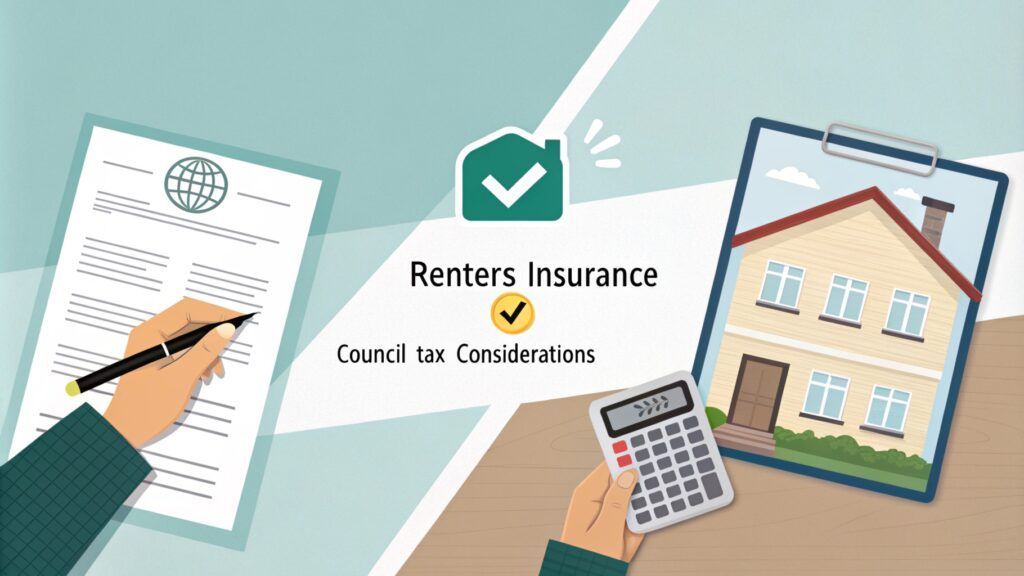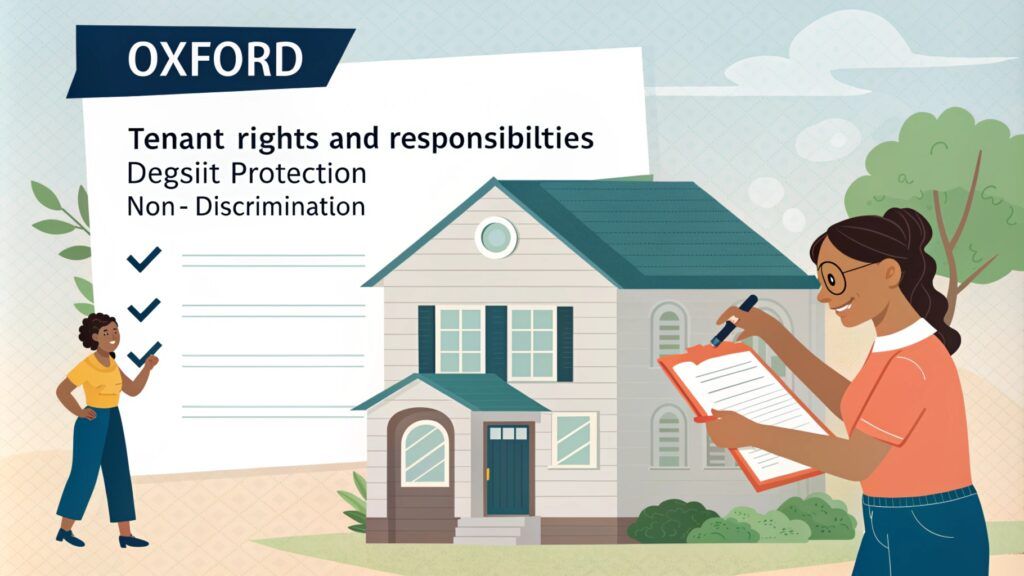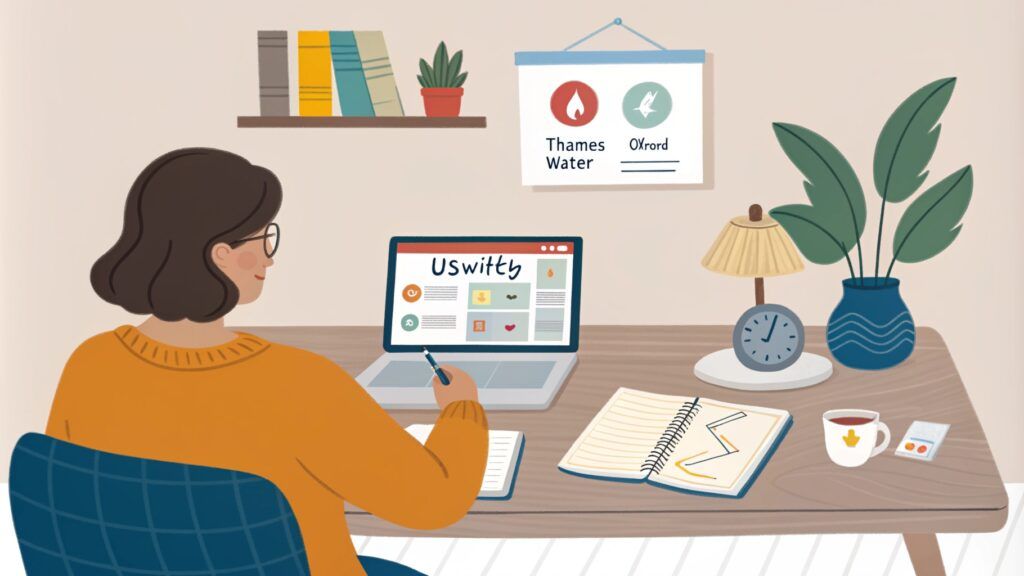
The two universities and growing professional sectors are the main reasons why Oxford has one of the UK's most competitive rental markets. Since demand is constantly higher than supply, rental prices are high, and finding affordable housing can be a challenge.
Here, properties rent quickly, and you need to decide almost instantly. Transportation is challenging, parking is limited, and congestion is frequent. A newcomer will have to settle for a small living space at premium prices.
The blend of academic prestige and historic architecture gives this city a unique character. It’s a compact, walkable city with lively neighbourhoods and green spaces but limited housing development. Unlike other UK housing markets, the Oxford rental market is rather rigid.
Market characteristics
Popular neighbourhoods:
Rental costs
Key timing
Required documents
Common mistakes to avoid
Resources available
Popular neighbourhoods for newcomers
Oxford offers a good variety of neighbourhoods, each with a distinctive character and catering to specific budgets and preferences.

Jericho
Close to the city centre and Oxford University, Jericho is a vibrant artistic area with many cafes, pubs, and independent shops. Students and young professionals choose it, even though its rental prices are rather high.
Cowley Road
People choose Cowley Road for its diverse community, dynamic nightlife, affordable rents, and a generous mix of housing—from flats to shared houses.
Summertown
If you want a quieter, family-friendly neighbourhood with convenient transport links and amenities, Summertown is the right place for you. The neighbourhood is perfect if you're looking for a suburban feel, with access to renowned schools and green spaces.
Headington
Close to Oxford Brookes University and the Oxford University Hospitals, Headington is popular among students and medical professionals. It offers both reasonable and pricey rents and a good range of cafes, shops, and parks.
University vs. private accommodation
Students and newcomers connected to the university can choose university-provided accommodation. Proximity to campus, easy access to student support services, and all-inclusive rent are benefits when choosing this sort of housing. Limited, university housing is typically allocated on a first-come, first-served basis.
Private accommodation, on the other hand, offers a wider range of options when it comes to location, type, and budget. Private rental is a good choice if your stay is longer than the academic year. Couples and families will also find private accommodation a better fit for their needs.
When it’s the best time to find housing
Summer months are the busiest in Oxford, as numerous students, academics, and professionals arrive for the new academic and work year. Start your search as early as you can. If you are a university-affiliated renter, remember that applications for university accommodation start in the spring. To secure good housing, start your search for private accommodation in June or July.
Are you moving to work in Oxford? If so, you can find a nice rental in the quieter months between January and March.
Reliable property websites and agencies
Use dependable property websites and local agencies such as:
Carefully examine neighbourhoods in Oxford to find the one most suited to your lifestyle and budget. Distance to university facilities and public transport can be paramount.
Average rent by area and property type
Location, property type, and proximity to the city centre significantly impact the rental prices. Here's what to expect:
Here you will find the most expensive rents, with one-bedroom flats ranging from £1,300 to £1,700 per month, and two-bedroom flats or houses ranging from £1,800 to £2,500.
The rent in Summertown and Headington is lower than in the centre, with one-bedroom flats ranging from £1,200 to £1,500, and two-bedroom properties ranging from £1,500 to £2,000.
These neighbourhoods are more economical, and rents for one-bedroom flats go from £1,000 to £1,300 per month, while rental prices for two-bedroom flats range from £1,300 to £1,700.
Additional costs and fees
If you reside in Oxford, you will need to cover a security deposit (commonly equal to 4-5 weeks of rent) and possibly an initial holding fee (in most cases, it will be deducted from the deposit). The Tenant Fees Act has capped most rental fees, but renters should also budget for referencing checks and fees for lost keys and early termination (if applicable). To protect personal assets, rental insurance is recommended—it's only £10-£20 per month.
We recommend you get renters insurance to protect your assets against theft or damage.
Council tax considerations
Add to your budget the council tax, whose amounts vary based on the property’s valuation band and location. Typically, the council tax ranges from £1,400 to £2,500 per year for an average property. Full-time students don’t have to pay the council tax. If you aren’t a student but share a property with one, you need to clarify things with housemates and the local council to see if you pay the council fee or not.

Utility cost estimates
Electricity, gas, water, and internet bills will add from £150 to £250 to your monthly spending. The amount depends on the property size and season, and an average breakdown looks like this:
Remember that most rentals don’t include utilities unless otherwise specified. To cut down your energy bills, you can use energy-efficient appliances and a smart thermostat.
Budgeting tips for living in Oxford
With such high rental prices, it's understandable why you would want to carefully budget. Here are some tips:
You will save a lot on rent, utilities, and council tax when renting a room in a shared house or flat. Cowley and Headington are places where shared housing is popular.
Since Oxford has limited parking and high transport costs, you may want to try biking or using the bus system.
It's expensive to dine out in Oxford, so cook at home and shop at local markets or cheap grocery stores whenever possible.
Mint or Yolt are apps that track your monthly expenses on rent, food, utilities, and leisure. They can help you budget and keep an eye on your expenses.
Oxford has a reputation for high living costs. Be ready to pay around £95 per week for personal expenses and £85 meal costs for meal costs.
Required identification
When you apply for a rental in Oxford, you need to prepare identification documents such as:
Needless to say, your identification should be current and valid.
Proof of income/student status
Landlords have to make sure that you can pay the rent, and they will ask for proof of income. As an employee, you will need to provide them with:
Students need to provide evidence of their student status, such as:
Proof of sufficient savings and other sources of income to cover the rent may also be necessary for both employed tenants and students. This is common, especially when your income isn’t regular.
Reference requirements
It’s not unusual for landlords to require references to form an idea about you as a tenant. They may ask you for:
A letter or contact details of your previous landlord who can provide information about your rent payment history and property maintenance.
The employer can write you a reference that includes details about your job, salary, and stability.
Some landlords may also request personal character references, especially when you don’t have employment-based references or rental history.
Visa documentation (for international renters)
If you're renting in Oxford from abroad, you will need to provide:
You have to prove that you are legally allowed to reside and work or study in the UK. Student visas, work visas, or EU Settled Status documentation are common visas.
According to UK law, landlords must check that all tenants have the right to rent in the country. You need to show your visa or residence card to your landlord or letting agent. Make sure that your visa documentation is up to date and prepared.
Guarantor requirements
If you don’t have enough income or rental history, be prepared to provide a guarantor to your landlord. The guarantor is often a parent or close relative who agrees to pay your rent if you fail to do so. Guarantors have to provide:

Viewing arrangements
Start by scheduling property viewings. After you spot a property you like, contact the landlord or letting agent to arrange a viewing. During the viewing, ask questions about the rental and see if it suits your needs in terms of size, location, and price.
Many agents now offer virtual tours or video calls when you cannot attend a physical viewing.
Making an offer
If you are interested in a property, make an offer to the landlord or letting agent. Since the market is so competitive, make a strong one: agree to the listed rent amount, pay a larger deposit, or be flexible about the move-in date.
Deposit protection schemes
Once the landlord accepts your offer, they will require you to pay a deposit—typically equal to 4-6 weeks' rent. By law, landlords have 30 days to protect the deposit in a government-approved tenancy deposit protection scheme.
You should receive written confirmation of the scheme used to protect your deposit and details of how it will be returned at the end of your lease (as long as you leave the place in pristine condition).
Contract signing
Once you agree on the terms, you sign the tenancy agreement, which mentions the terms of the rental, the length of the lease, your responsibilities as a tenant, and the landlord's obligations. Carefully read the contract and pay attention to:
Before you sign, thoroughly read your lease agreement and the clauses about maintenance responsibilities, deposits, and periods for ending the tenancy.
Inventory checks
Before you move in, your landlord or letting agent will conduct an inventory check to document the condition of the property and its contents. To avoid any disputes over the deposit refund, be present for this. The inventory will include detailed notes on:
Carefully examine the inventory and take photographs. If there are discrepancies or missed damages, talk to the landlord to avoid misunderstandings.
Carefully review specific contract terms
Make sure the rent amount, due date, and payment method are clearly stated.
The deposit amount should be mentioned, along with details about its protection.
Check the length of the lease and any early termination or break clause.
See who is responsible for repairs and upkeep, particularly when it comes to appliances, outdoor spaces, and any communal areas.

Many leases mention limits on subletting or hosting guests long-term. If you plan to share with other renters or expect visitors, make sure that the rules meet your needs.
Watch out for the red flags
Common red flags include:
Vague language or missing details about key terms (like rent increases) can make a contract confusing.
If your landlord makes any promises, make sure they are all written in the contract.
Keep an eye out for unusual fees that aren’t covered by the Tenant Fees Act, such as excessive late payment penalties or unreasonably high charges for administrative tasks.
Walk away if the landlord hesitates or doesn’t want to share required safety documents—it indicates poor property management.
Energy Performance Certificates (EPC)
The Energy Performance Certificate (EPC) rates a property’s energy efficiency from A (most efficient) to G (least efficient). A higher EPC rating means lower energy costs, so choose a property rated E or higher. Landlords must provide this document before you sign the lease.
Safety Certificates
To prove that the property meets legal safety standards, landlords have to provide:
Required for properties with gas appliances, the certificate confirms the appliances have been inspected by a registered engineer within the last 12 months.
Every five years, a qualified electrician must check the electrical installation. You need to receive a copy of it before moving in.
Landlords must install smoke alarms on each floor and a carbon monoxide detector in any room with a solid fuel appliance (like a fireplace). See if the alarms exist and are functioning properly before you sign the lease.
Property condition assessment
Examine the property and walk each room to check:
See if there are cracks, water stains, or peeling paint—they can signal dampness or structural problems.
Check out appliances, lights, faucets, and heating—they should all function properly.
All windows and doors should be secure, lockable, and in good condition, and ensure good insulation.
Inspect every piece of furniture and take photos of any existing damage.
Check if the rental comes furnished and what utilities are included. This will help you avoid unexpected expenses or the need to buy various items.
What is transportation like in Oxford?
Proximity to public transport
Mainly operated by bus, Oxford’s public transportation network is extensive and effective, which eliminates the need for a car. When you choose a rental, see if it’s close to key bus routes, especially if you need to commute every day.
Cycling infrastructure
This is a bike-friendly city, with numerous cycling paths and infrastructure, dedicated bike lanes, and safe zones where cars have restrictions. Jericho, East Oxford, or along the Botley Road are great places to rent if you bike a lot. As a newcomer, you should also check out Oxfordshire’s bike hire schemes—they provide rental bikes on a short-term basis.
Parking permits and restrictions
Due to its historic layout and environmental initiatives, Oxford has limited parking and you often need a permit. See if your future rental falls within a Controlled Parking Zone (CPS), where you get a permit to park on the street. Rental properties closer to the city (like Jericho) have stricter parking restrictions.
Choose Summertown or Headington if parking is a top priority for you.
Walking distances to key locations
Thanks to its compact layout, this city offers key locations within walking distance of one another. University buildings, shops, libraries, and social spots are easy to access on foot when you live near the city centre or in Jericho or Cowley.

Student-friendly neighbourhoods
If you are a student, you want to be close to the campus, pay a decent rent, and have access to amenities. Therefore, your best neighbourhoods are:
Close to Oxford University’s central colleges, Jericho is a liveable, walkable neighbourhood with many cafes, pubs, and cultural spots. The rents are high, but many students choose it for its proximity to the university and city centre.
Renowned for its eclectic and energetic atmosphere, Cowley Road is highly popular among students. The rental prices are economical, there are many diverse eateries, bars, and a colourful community.
Professional neighbourhoods
Young professionals prefer areas with convenient transport links, modern amenities, and a perfect balance between work and leisure. This is why Summertown and Headington are ideal:
Located north of the city centre, Summertown is a quiet neighbourhood with upmarket vibe. The transport links to the city centre are excellent, and the neighbourhood offers various cafes, shops, and fitness centres.
Headington is close to Oxford’s hospitals and Oxford Brookes University, which is why it’s so popular among healthcare professionals and people working in academia. With rents lower than in Summertown, Headington attracts with its wide range of housing options, shopping amenities, and green spaces.
Family-oriented neighbourhoods
Families look for neighbourhoods with green spaces, reputable schools, and a strong community feel. Botley and Marston check off these criteria:
Located west of Oxford, Botley offers simple access to the city centre, large houses, parks, and excellent primary schools. It’s a quiet neighbourhood with a suburban feel and many community amenities.
People appreciate Marston for its many good schools, parks, and leisure facilities. Access to Oxford University and John Radcliffe Hospital is simple, and Marston attracts families with its spacious housing and family-friendly environment.
Budget-friendly options
If you are on a budget, consider Blackbird Leys and Iffley Road:
As one of the most affordable areas in Oxford, Blackbird Leys has regular bus routes and is ideal for people who want larger, yet cheaper housing.
Iffley Road attracts tenants with inexpensive flats and shared housing. Students and young professionals choose Iffley Road for its location and convenient access to the city centre and Oxford Brookes University.
Avoid these areas
Even though Oxford is typically safe, some areas present higher crime rates or lack amenities that a newcomer would want. Parts of Greater Leys and Littlemore are further from the city centre and lack amenities and a lively feel. Blackbird Leys offers low-cost housing, but the crime rates are higher.
Have a calendar or planner to manage important dates related to your lease, such as maintenance requests or renewal deadlines. Stay organized to avoid stress.
What rights and responsibilities do you have as a tenant in Oxford?

Tenant Rights in Oxford
The UK rental laws protect you as a tenant here, and your essential tenants’ rights include:
You have the right to live in a safe and well-maintained property, free from dampness, mould, and faulty appliances.
Apart from emergencies, landlords must give you at least 24 hours’ notice before they enter your rental.
After you pay the deposit, the landlord has 30 days to protect it in a government-approved scheme.
Landlords cannot discriminate based on race, religion, gender, sexual orientation, or disability.
Get familiar with tenant rights in the UK, including problems related to repairs and landlord responsibilities. It can help you when problems occur.
Maintenance responsibilities
Even though the landlord is responsible for most structural and major repairs, you also have responsibilities such as:
You must handle minor tasks, such as replacing lightbulbs, keeping the property nice and tidy, and managing problems like condensation.
To prevent further damage, you have to promptly inform the landlord about any maintenance problems.
If it’s mentioned in the lease, you must manage basic garden upkeep, such as trimming plants and mowing the lawn.
Notice periods
The notice period for ending a tenancy depends on the lease type and duration
If your lease is for a fixed term (e.g., 12 months), you cannot end it early unless there is a break clause. Both you and your landlord should give notice as stated in the lease.
The standard notice for a month-to-month lease is one month for tenants. For landlords, the notice period is two months).
Dispute resolution
Repairs, deposit refunds, and rent increases are some of the most common causes of disputes with landlords. Here are some solutions for resolution:
Direct, polite communication can resolve many disputes.
You may contact the Oxford branch of the Citizens Advice Bureau for free legal advice and mediation services.
If you suspect unfair deductions from your deposit, you may seek resolution through the tenancy deposit scheme, which offers a free adjudication service.
Contact the Oxford City Council Housing Standards team to investigate when your landlord doesn’t fulfil their legal obligations. They will take action on your behalf.
Landlord obligations
To ensure your safety and comfort, landlords have several legal responsibilities:
They must keep the property (including structure and exterior) and essential systems (heating, gas, and electrical wiring) in good repair.
Landlords must provide an up-to-date Gas Safety Certificate and an Electrical Safety Certificate. They must install smoke alarms on every floor and a carbon monoxide alarm in any room with a solid fuel source.
Landlords must handle urgent repairs (heating problems, leaks, broken locks, and similar) within a reasonable timeframe.
Essential utilities set up
A top priority should be setting up essential utilities (gas, electricity, and water). Check with your landlord to see if they are already arranged. If not, you need to contact providers and set up accounts in your name.

In the UK, including Oxford, it's common to choose your own gas and electricity suppliers. Use a comparison website like Uswitch to find the best rates for your needs. There's just one water provider in Oxford (Thames Water).
To avoid being charged for previous usage, take meter readings upon moving in.
Internet providers
There are many dependable internet providers in the city, and it can take up to two weeks to have internet installed. Some providers offer short-term arrangements with flexible, month-to-month contracts.
Council registration
You have to register for council tax which funds local services such as libraries, waste collection, and public spaces.
Local amenities
Familiarize yourself with the nearest grocery stores, GP practices, pharmacies, and banks. Sainsbury's and Tesco are in the city centre, while smaller, independent shops and speciality stores are found in Cowley and Jericho.
Several libraries are open to the public in Oxford (including the Oxfordshire County Library) and there are many local gyms, and fitness centres to explore.
Take time to explore and find nearby shops, grocery stores, and dining options. It will ease your transition into living in Oxford.
Emergency contacts
For your peace of mind, keep within reach:
999 is for urgent police, fire, or medical assistance. For non-emergency cases, dial 101 for police or 111 for medical advice.
To access medical care, register with a local GP. Find the nearest pharmacy and use the NHS website for detailed information.
In case of a gas leak, dial 0800 111 999 to contact the National Gas Emergency Service. Dial 105 to contact UK Power Networks for power outages.
Your landlord or letting agents should provide you with a number for emergency repairs, especially for water leaks and heating problems.
Rushing into agreements
Since Oxford has such a competitive rental market, you might be tempted to rush into an agreement to secure a property, which can only cause more spending down the line. Carefully read your lease, and understand all terms, and notice periods. Ask as many questions as necessary to avoid unpleasant surprises in the future.

Ignoring red flags
When you view properties, watch out for red flags as they may indicate problems with the property or the landlord’s management strategies. Damp, poor ventilation or faulty appliances are signs of neglect and may worsen over time. A landlord who appears evasive about legal requirements (deposit protection, safety certificates, and so on) isn’t to be trusted. Listen to your gut feeling and keep your distance if something doesn’t sit well with you.
Deposit protection oversights
Not confirming the deposit protection is more common than you’d think. By law, after receiving it from you, landlords have 30 days to place your deposit in a government-approved tenancy deposit protection scheme.
Communication failures
Avoid misunderstandings by having honest, clear, and respectful communication with your landlord. Write all important requests (repairs, maintenance problems, clarifications about the lease) to have a clear record and ensure timely responses. Plus, written communication is crucial evidence in dispute resolution.
Hidden costs
Look out for the hidden costs like the council tax, utilities, and internet setup fees. See if there are maintenance costs, parking fees, and charges for shared spaces like hallways and gardens.
University housing services
Students find university housing services to be a crucial resource. Both Oxford University and Oxford Brookes University offer dedicated support for students looking for accommodation. University housing offices can offer advice on student-friendly housing options, streamline the application process, and even offer support in finding university-managed accommodation.
In case of any problems with landlords and housemates, they can offer support during your lease.
Local council resources
The Oxford City Council offers a range of services for renters, especially when it comes to local housing regulations, tenancy disputes, and council tax problems. The council’s Housing Services team can help you understand your tenancy rights, find accommodation, and navigate the application process for social housing (if applicable). On the council’s website, you will find information on council tax exemptions and how to register for services like recycling and waste collection.
They can also advise on emergency housing options and local homelessness services.
Tenant advisory groups
Several tenant advisory groups here offer assistance on a wide range of issues, from rental agreements to eviction problems. Oxford Tenants Union is a major source, offering guidance on resolving disputes with landlords. They can offer support in cases of unfair rent increases, safety violations, and property conditions.
Join student groups or forums to share experiences and get advice from other renters in Oxford. It's a great source of information for local tips and the rental market.
Community support networks
If you are new here, you will find a good range of community support networks ready to help you. Oxford Homeless Project or Oxford Community Action help people with financial difficulties, housing instability, or social isolation. Join local online groups or community organizations on social media platforms to get connections and recommendations from other residents.
Legal Aid Services
If you are dealing with legal problems or disputes with your landlord, reach out to one of the many legal aid services. The Citizens Advice Bureau offers free advice on legal issues, including tenant rights, housing disputes, and evictions. Contact Shelter for more specialized legal assistance or look for law firms that offer free or low-cost consultations when you need specific legal representation.
There's a lot of rain in Oxford, so pack appropriate clothing and think about how the weather might impact your daily activities or commute.
RESOURCES
https://osapabroad.com/students/preparing-for-oxford/
https://www.history.ox.ac.uk/article/settling-in-at-oxford
https://www.kingseducation.com/kings-life/how-to-prepare-for-oxford-university
https://www.ox.ac.uk/admissions/graduate/international-applicants/advice-international-applicants
https://www.summerboardingcourses.com/blogs/how-to-apply-to-oxford-10-proven-tips-for-success-2024/
https://www.ox.ac.uk/sites/files/oxford/field/field_document/11%20freshers%20tips.pdf
